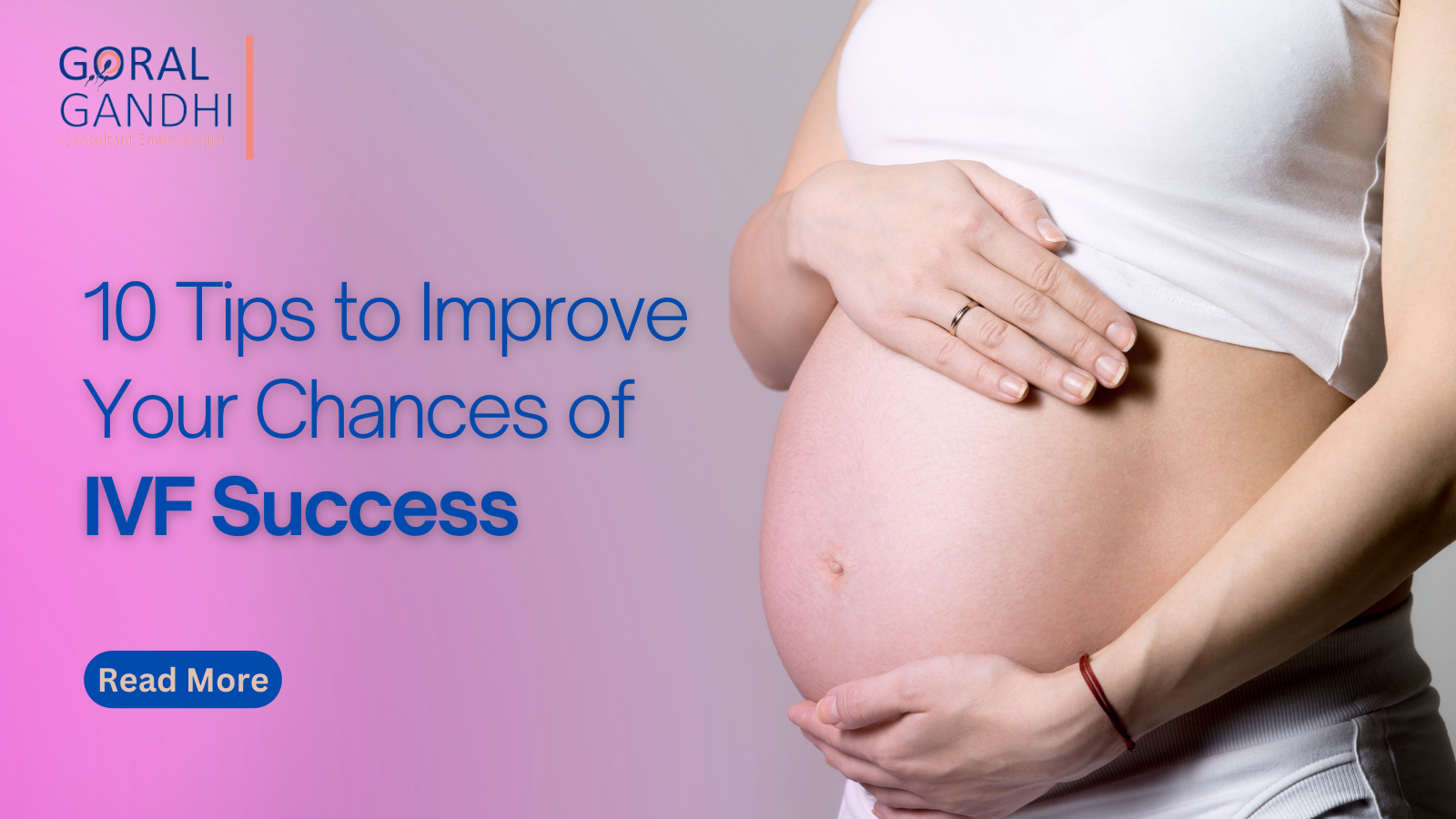

E-Brochure - Download Now!


Imagine the excitement of starting a family, only to face challenges in getting pregnant naturally. For couples struggling with this, in vitro fertilization (IVF) provides hope. IVF involves fertilizing an egg with sperm outside the body and putting the embryo in the uterus.
Even though IVF can be complex and emotional, there are ways to increase your chances of success if you are taking the proper steps before, during, and after the IVF treatment. In this blog, discover tips to boost your IVF success and explore expert tips for a successful IVF journey, increasing your odds of a positive outcome.
IVF is a medical method to help people have babies when they're having trouble doing so. It's like giving nature a little boost.
Usually, a woman releases one egg each month, but with IVF, we want more eggs to increase the chances of success.
Once the eggs are ready, the gynecologist collects them from the woman's ovaries along with a lot of fluid. They do this using a thin needle, and it's not very painful because the woman is usually given anaesthesia. The embryologist then identifies all the eggs from the fluid, cleans them well and keeps them in a very safe environment.
At the same time, the man provides a sample of his sperm. The embryologist separates out all the good sperms and uses the healthiest sperms.
The embryologist combines the collected eggs and sperm in a particular dish. It gives the sperm a chance to fertilize the eggs, just like in the woman's body. In case of very poor sperm quality, the expert embryologist selects a healthy sperm and injects it into the egg, in a very advanced procedure known as intracytoplasmic sperm injection.
Once the eggs are fertilized, they turn into embryos – tiny baby beginnings. The embryologist watches them closely to see how they're growing. Not all embryos develop the same, so the embryologist selects the healthiest ones.
The selected healthy embryos are placed into the woman's uterus. This part is different from getting a regular checkup – it's usually not painful.
Now, the woman waits to see if the embryo attaches to her uterus lining. If it does, she becomes pregnant!
After a couple of weeks, the woman takes a pregnancy test to determine if the IVF worked. If it did, she's on her way to becoming a parent!
Remember, the goal of IVF is to help people who are struggling to have a baby. It's a medical way to bring joy and happiness to families.
Embryologists play a critical role in the in vitro fertilization (IVF) process, and their expertise is essential for the procedure's success. Here are some key aspects highlighting the importance of embryologists in IVF:
Selecting the right IVF clinic is crucial. Look for clinics with experienced reproductive endocrinologists and even more experienced embryologists. Remember, it is the embryologist who is going to make your babies - fertilise the egg with well selected sperms, nourish the embryos, look after them in the IVF laboratory, and finally select the best embryo for transfer! Look for positive patient reviews, and success rates. A good clinic will provide clear information, answer your questions, and guide you.
Eating a balanced diet rich in nutrients can help create a healthier environment for your body during IVF. Include fruits, vegetables, whole grains, lean proteins, and healthy fats. A well-nourished body is better prepared for the IVF journey.
Stress can impact the IVF process. Relaxation techniques like meditation, deep breathing, and gentle exercises can help reduce stress levels. It's essential to keep your body and mind as calm as possible.
Adequate sleep is crucial for overall health and hormonal balance. Aim for 7-9 hours of quality sleep each night. Good sleep supports your body's systems and enhances your chances of success with IVF.
Being either underweight or overweight can affect fertility and the success of IVF. Aim for a healthy weight through a balanced diet and moderate exercise. Consult your clinical embryologist before making any significant changes.
Both smoking and excessive alcohol consumption can harm fertility and the developing embryo. It's best to quit smoking and limit alcohol intake before and during IVF to improve your chances of success.
Following your clinical embryologist instructions for medication is crucial. IVF often involves a specific schedule of medications to regulate hormones and support the process. Taking your prescribed medicines on time ensures the best possible outcome.
Hygiene is essential to prevent infections, which can be risky during IVF. Follow proper hygiene practices, especially around egg retrieval and embryo transfer.
IVF can be emotionally challenging. Surround yourself with a supportive network of friends, family, or Support groups. Staying positive and managing stress can make the process smoother.
IVF is a journey that involves both partners. Keep the lines of communication open with your partner. Share your thoughts, fears, and hopes. This unity can provide much-needed emotional Support.
Are you ready to explore your fertility journey or gather more information about IVF treatment?
Schedule a consultation with Goral Gandhi, a leading embryologist and consultant in Mumbai at Global IVF Clinic, who is well-versed in the intricacies of fertility treatments. Allow us to be your guide, addressing your concerns and providing you with the expert insights you seek. Contact us and schedule a complimentary consultation with us today. Together, let's transform your parenthood aspirations into a beautiful reality.